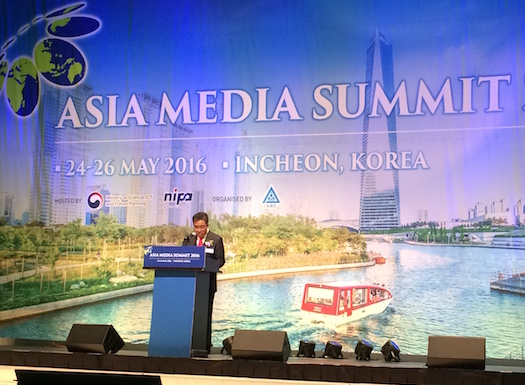At the opening ceremony of this year’s Asia Media Summit, a statement from Ban Ki Moon, read by AIBD’s Chang Jin, delivered a strong message from the UN about media freedom:
“Media serve as the eyes and ears of people, yet many journalists are harassed or killed in their work. I am very concerned about the safety of media workers. I will continue to urge all politicians and citizens to strive for a free media.”
Chang Jin outlined a range of new initiatives from the AIBD, which include new media research, workshops on how to improve media coverage of the UN’s sustainable development goals and a new set of awards for intercultural understanding. He invited everyone to assist in capacity building of media in the Asia Pacific region.
Korean ICT Minister Choi Yanghee outlined a range of technological developments including artificial intelligence and the internet of everything, saying that such developments must collaborate with the creation of great content to achieve further advancement in the media.
AIBD Conference President Rosarita Niken Widiastuti from Indonesia talked about the convergence of media platforms that is taking place across Asia:
“The diversity of media and the expanded size of the broadcasting industry is satisfying audiences, but we must maintain a balance of local content along with all the new content that is coming from international markets… Media worldwide is big business, it has an effect on local broadcasting businesses. We as broadcasters are beginning to segment and price programs differently. Broadcasting is moving beyond linear to on demand and multi screen delivery on many platforms made possible by internet streaming and mobile delivery.
“Given the technology and business opportunities in media, content is still the way ahead. But what are the new ideas for content? In this summit, we hope to find some answers to the development of innovative content in the new media landscape to achieve a competitive edge as we compete even more for audience time, to build mutual respect, prosperity and peace across the Asia Pacific.”
Korean Communications Commisssion head Lee Ki Joo said the conference will provide opportunities for co-productions and sharing creative ideas.
Famous Korean actor Song Il Kook finished the opening ceremony by welcoming delegates to his country and wishing the conference success.

In the second session of the Summit, General Manager of Production at CJE&M, Hwang Jin Woo said 70% of young adults watch and listen to media on mobile devices while older audiences watch on traditional tv and listen on traditional radio.
“It is not what we want the audience to watch, but we should consider what the audience wants. It is our duty as content creators to unify audiences by meeting them on their platform of choice.
“Creating great content will create fans and fans will share your content more than you can imagine,” he said.
Deputy Director General of China’s Media Administration Yan Chengsheng said Asia is an important market for China. “China encourages collaboration and development in the media sector. Chinese government has put effort into developing media in our own country and assisting Asian countries,” he said.
President of Oceania TV in Palau, Jeffrey Barabe said many broadcast companies went through the stages of loss when the internet was introduced: Denial, Anger, Bargaining, Depression, Acceptance.
“People adapted to the internet as it grew, but countries which are just beginning to connect go from nothing to everything in an instant. There is no time to adapt. This will happen in my country Palau next year. There is a very real need for local content. We will continue to create the content that our viewers like which will help us survive.”
The Communications Minister of Cambodia Khiet Kankarith outlined the amount of media in his country. There are 17 tv stations and 150 radio stations in Cambodia, but these are being challenged by new media. “We must use new and social media to support our existing media businesses,” he said.
Nasir Jamal from Pakistan said social media is having a strong influence around the Asian region and that free media will be important for broadcasters to battle new media. “However, most state broadcasters are not free. With the exception of NHK in Japan, public broadcasters across Asia are devoid of freedom. Governments still retain control of state broadcasters in most Asian countries,” said Jamal.

